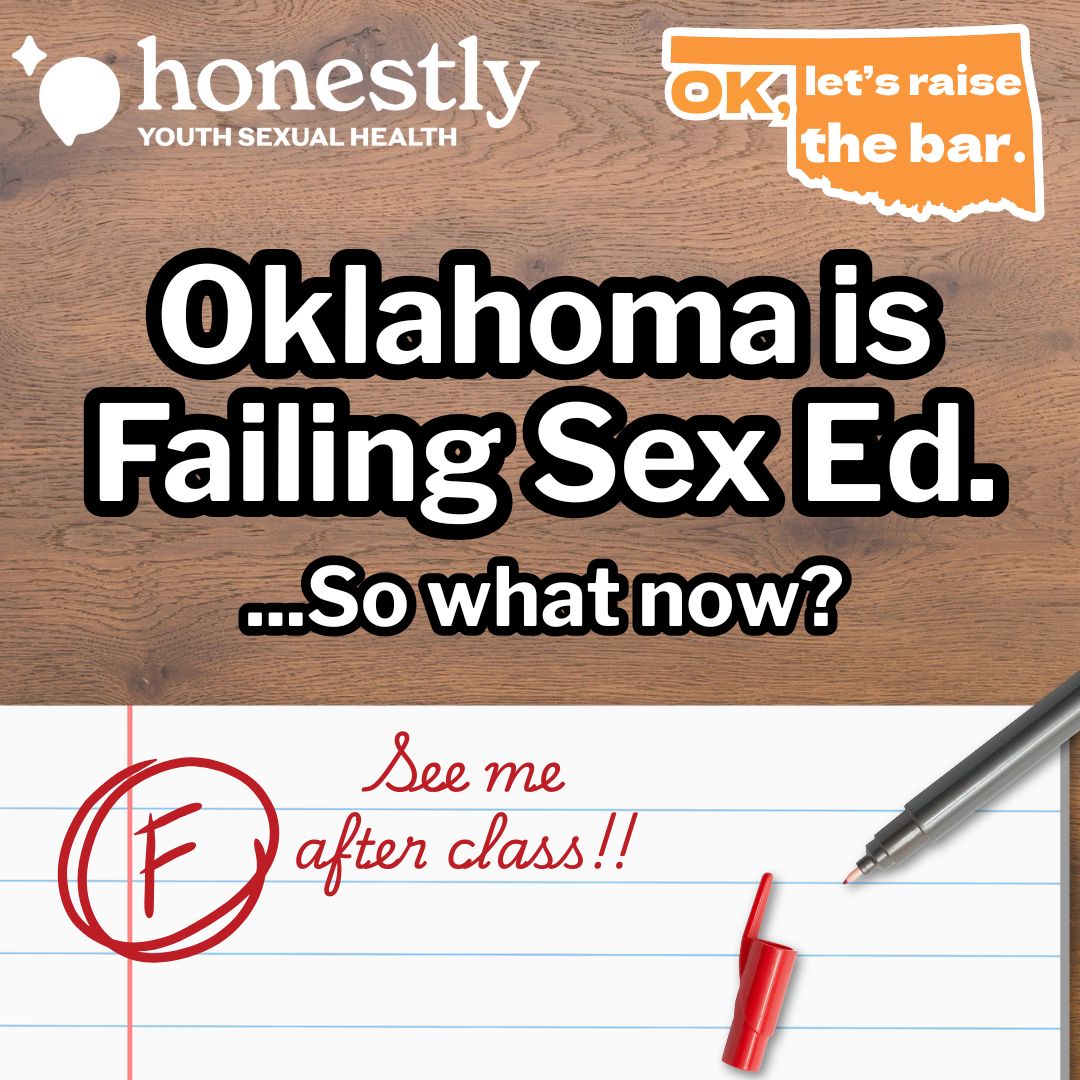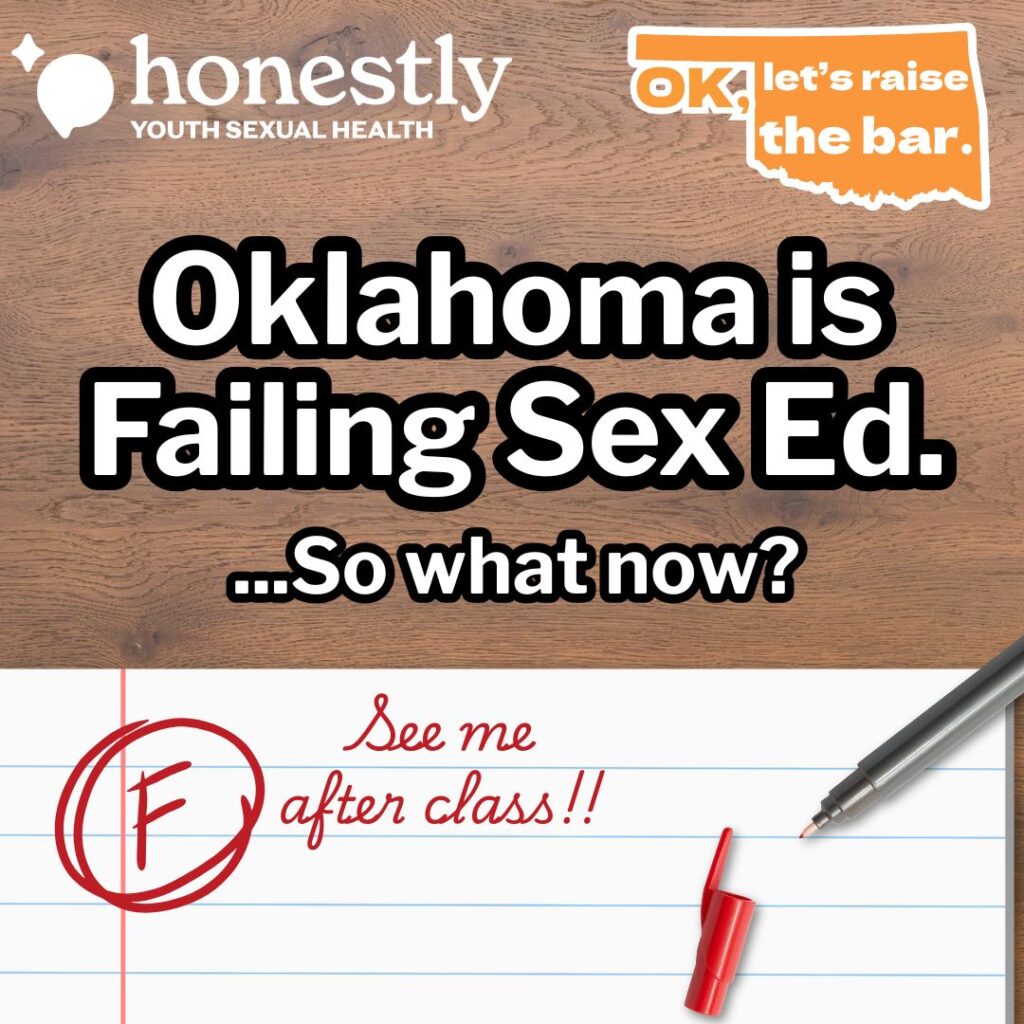We know that may not sound like a major issue to some Oklahomans, but it’s a pretty big deal. Failing sex ed is like failing a core class – you won’t be ready for the real world without it.
SIECUS released the 2025 State Profiles and scorecards that provide an overview, grade, and closer look at sex ed in each state. The Oklahoma profile is dismal to say the least. From stigmatizing and inaccurate information about HIV/AIDS to a lack of sex education requirements, it’s easy to see why Oklahoma scored an overall F grade.
Why not change the laws to get a better grade?
It’s been difficult for policymakers to focus on making vital improvements like a statewide mandate on comprehensive sexual health education. This is mainly because those lawmakers who are in support of sex ed have historically had to put their efforts towards stopping legislation that could make things even more restrictive.
Some attempts to limit sex ed have been as broad-reaching as attacking social and emotional learning in general, while others have been more subtle. For example, policymakers have tried to change the opt out policy to an opt-in policy. This may seem, at first glance, not so harmful and even a way to ensure parents are active in these conversations—but unfortunately, the results of opt-in versus opt-out policies drastically reduce the effectiveness of sex ed programs.
At least young people are learning about AIDS prevention?
And that’s where we would almost be in agreement. AIDS prevention education that’s medically accurate, comprehensive and inclusive sounds great! But that’s not what young people in Oklahoma get.
According to Oklahoma law, education on AIDS prevention should include warnings that “homosexual activity, (and) promiscuous sexual activity” are primary ways to spread the AIDS virus, and that the only way to prevent the spread is to completely avoid those activities. The education requirement also states that someone who has sex with another person who is HIV positive is at high risk of contracting the disease even if they use a condom.
Medically speaking, this is incorrect. Homosexual activity and “promiscuous” activity (we don’t even like that word around here!) do not put someone more at risk just because of the activity itself. Someone engaging in any sexual activities, including heterosexual activities or those engaging in sex for the very first time, could put themselves at risk if they don’t know how to make safe choices. And just so we are all clear, condoms are a great example of a safer choice, regardless of what the statute says.
Why does it matter if we are failing sex ed?
- Sex education can be a major contributor to reducing the teen birth rate. Oklahoma has one of the highest teen birth rates in the country while we also have a low score for sexual health education. We believe those are directly correlated.
- Sex education can help decrease rates of sexually transmitted infections (STIs). Sure, abstinence can prevent STIs, but young people should also learn about all the other ways to stay safe and make healthy choices, especially since Oklahomans age 15-24 are largely affected by STIs.
- A failing grade can be a sign that there is a larger issue at hand. Oklahoma’s “F” grade isn’t a reflection on our young people, and it’s not a reflection on the educators who are doing everything they can to provide quality programs across Oklahoma. This scorecard is a warning that we need to approach change at a systems level to provide young people with the information they need to succeed in their adult lives. We are preparing them for the future, but an “F” in sex ed says we are preparing them to fail when it comes to their health and relationships.
Is it all downhill from here?
Not at all! There are already amazing organizations doing the work that needs to be done, like the Health Education Network partners, organizations that focus on inclusivity and healthy decision-making, and community members who support sexual health education.
But can we do more? You bet. Staying active with local and state policy can help ensure our lawmakers do not put up further barriers to education, which is vital. If you are able, donating time or donating financially in support of the Central Oklahoma Teen Pregnancy Prevention Collaboration can also be helpful. Donations to honestly support partner development, education, and advocacy efforts.
While Oklahoma might currently be failing sex ed, that doesn’t mean it’s impossible to bounce back. There is much to be done and undone, so we must continue moving forward with the confidence that Oklahoma CAN ace this scorecard with a system that sets our youth up for success.






